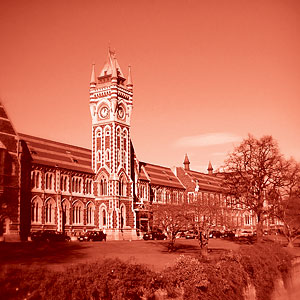 College is a great time to experiment. That’s exactly what the Medical Devices Center (MDC) at the University of Minnesota encourages students to do. The 4,000-square-foot facility promotes interdisciplinary medical device development, including needs assessment, creative brainstorming, prototyping and testing.
College is a great time to experiment. That’s exactly what the Medical Devices Center (MDC) at the University of Minnesota encourages students to do. The 4,000-square-foot facility promotes interdisciplinary medical device development, including needs assessment, creative brainstorming, prototyping and testing.The center is run under the auspices of the College of Science and Engineering, the Institute for Engineering in Medicine and the Academic Health Center.
“We started the facility in 2007 after a $5 million allocation from the university,” says Art Erdman, a professor of mechanical engineering who serves as MDC director. “We patterned ourselves after Stanford’s Biodesign initiative, which encourages multidisciplinary approaches to biology and medicine.
“The center provides resources and assistance to researchers and industry partners in the medical device design process from concept through clinical trials,” adds Erdman. “It directly fills the void of going from idea to advanced prototype that wasn’t there before.”
The lab features state-of-the-art equipment that allows researchers to view live surgeries in 3D, a computer-aided design precision-instruments area, and mechanical and electronics fabrication centers. More than 10 rooms contain shared equipment that students use to design and test a wide variety of medical devices. Key facilities include:
- Assembly, Molding and Brainstorming. This room contains fastening tools, adhesive dispensers and a sewing machine, in addition to simple molding capability to create 3D parts. “In the brainstorming section, we have smart boards, white boards, and lots of raw materials, such as clay and foam, to mock-up prototypes,” says Erdman. “Students also use the room to ‘dissect’ existing medical devices to see how they work.”
- Electronics Fabrication. This lab is stocked with a wide variety of electronic components and soldering tools, in addition to signal generation and data acquisition equipment.
- Mechanical Fabrication. The machine shop includes a high-precision benchtop lathe, a milling machine, a drill press, a band saw and a variety of measurement tools.
Several large medical device manufacturers, such as Boston Scientific Corp., Medtronic Inc. and St. Jude Medical Inc., donated much of the equipment. In addition, Boston Scientific and St. Jude donate $50,000 a year to the facility.
More than 200 students currently use the Medical Devices Center. “At any one time, we’re usually working on 30 to 40 different medical technologies and applications,” says Erdman. “Some of our recent activity has focused on biopsy systems, diabetes, orthopedics, sinus and veterinary medical devices.
“Most of our participants are undergrads, but we also have eight fellows,” adds Erdman. “Our fellow program is an intensive, year-long, full-immersion educational and intellectual property development program. A cross-disciplinary team, with a combination of degrees in engineering, medicine and biosciences, interfaces daily with faculty, medical professionals and industry collaborators to develop and test ideas for new medical devices.”
Research conducted at the Medical Devices Center has generated numerous patents and has spawned several start-up companies. For instance, Aria CV Inc. was recently created to commercialize a medical device for the treatment of pulmonary hypertension.
The MDC also hosts an annual Design of Medical Devices Conference. The three-day event attracts more than 1,000 attendees interested in learning about the latest trends in medical device design, policy, engineering, education and commercialization. It features multiple speakers and technical workshops on topics such as cardiovascular engineering, medical electronics, power for implanted devices and virtual prototyping.
“The DMD conference continues to grow by all measures, illustrating the critical importance of medical devices and surrounding technologies, policies and clinical needs,” says Erdman, who serves as co-chairman of the event.
This year’s event will be held in Minneapolis on April 10-12. For more information, call 612-624-2901 or click www.dmd.umn.edu.



